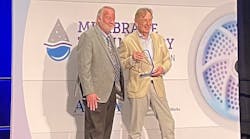Today, at the Asia-Pacific Water Forum’s Regional Session, Dr. Ibrahim spoke about Singapore’s experience in Integrated Water Resource Management (IWRM), and facing similar water challenges to what many countries experience today, notably the need to provide sufficient water and basic sanitation.
Excerpts for his speech are as follows:
Clean-Up of the Singapore River & Creation of Marina Reservoir. “The Singapore River is the main river flowing through the heart of the city. More than 30 years ago, this river was practically an open sewer, polluted by sources such as animal waste from farms along the river, and sullage water from street hawkers, markets and squatters next to the river. In the 1970s, the Prime Minister challenged the Environment Ministry to clean up the river. It was a massive and daunting project, considering the number of polluting industries, farmers and squatters that had to be relocated. Within ten years, however, the river was clean enough for fishes to return. The clean-up of the Singapore River was only possible through sheer hard work, determination, and political will. Tackling water challenges requires a holistic approach and cannot be the prerogative of one agency alone. Although the project was led by the Environment Ministry, it required the joint efforts of many other government agencies working closely - be it building proper homes for the squatters, re-locating industries and hawkers, or extending the sewerage system to reduce pollution. Underpinning and driving these efforts and coordination was strong political will and leadership. The project also underscored the importance of planning with a long term view in mind. Having cleaned up the river, we were able to create the first city reservoir in Singapore, the Marina Reservoir. This is rare, since city centres tend to be densely built-up, with attendant pollution problems. In overcoming this, we can now tap on a water catchment one-sixth the size of Singapore, increasing our water supply.”
NEWater and Desalination. “Apart from developing our water catchments and keeping them clean, Singapore also leveraged on technology to develop new water sources. We exploited improvements in membrane technology to develop NEWater and desalinated water to augment our water supply. NEWater is ultra-pure water produced by recycling treated used water, which we supply to industries and commercial buildings for non-potable purposes. By reusing each drop of water, recycling can effectively double our water supply. With NEWater and desalination, we have diversified our water resources to meet Singapore's long-term water needs. Compared to the past, there are now many practical solutions and low cost technologies available to help water authorities overcome their natural constraints."
'Ministers for Water Security' Initiative. “While the context of each country's water challenges is unique, the lessons I shared underscore the point that solutions are available, so long as there is sufficient leadership and appropriate water governance. With more leaders in Asia Pacific embracing this, water security in the region will be improved and this is the objective of the 'Ministers for Water Security' initiative. Singapore recognises the criticality of water security in the region and supports the initiative. Moving forward, a key focus of this initiative should be urban water solutions. This is increasing pressing with rapid urbanization and the growth of new cities in the region. This focus could be addressed at two levels: firstly, improving the leadership and governance aspects and secondly, investing in capabilities. This builds on the achievements of the APWF thus far. In particular, the APWF KnowledgeHubs initiative has already seen the establishment of 13 knowledge hubs to share knowledge and best practices. I am pleased to report that on Singapore's part, the Institute of Water Policy at the Lee Kuan Yew School of Public Policy, which focuses on water governance, had a successful run of its inaugural programme on leadership in water governance in November 2008, with participation from 20 senior policy makers spanning 13 countries. Our other knowledge hub, the Waterhub, which focuses on urban water management, has conducted workshops for about 600 participants from 45 countries since the formation of APWF in Sep 2006. Another aspect of capability development is the advancement of technology to generate practical and cost effective solutions. Singapore is helping to push the technological front in energy efficient water production. We are exploring various alternatives such as membrane distillation. We also made a Challenge Call in 2007 to the international research community to come up with innovations to desalinate seawater which is at least 50% more energy efficient than current technologies. More recently, the Lee Kuan Yew Water Prize recognized the contributions of Prof Gatze Lettinga for his work in energy efficient anaerobic used water treatment technologies.”
Minister Yaacob is accompanied by officials from the Ministry of the Environment and Water Resources and PUB, Singapore’s national water agency.
Themed 'Bridging Divides For Water', this World Water Forum is a top-flight forum at which and policy-and-decision-makers from all over the world will come together to offer the global water community solutions to achieve water security.
Source: JCN Newswire

